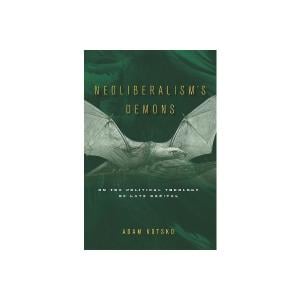Here I continue discussion of theologian Adam Kotsko’s book Neoliberalism’s Demons: On the Political Theology of Late Capital (Stanford University Press, 2018). If you have read the chapter, feel free to comment. If not, only ask a question.
This chapter contains a lot of references to other books and articles about neoliberalism but with focus on philosophers who discussed the relationship between politics and economics. Kotsko sides with those who argue that the relationship is not binary and argues that, ultimately, the political is ruled by the economic, especially in neoliberalism, but in capitalism generally.
So where does “political theology” come in? On page 62 Kotsko refers to a scholar named Goodchild who “wishes to discern the theology that is already implicit in the practice of capitalism.” Then, “He is saying that capitalism directly implies its own theology, centered on money as the Tillichian [theologian Paul Tillich’s] ‘ultimate concern.’ In a world where money is effectively God…what theology is implied?”
This is a transitional chapter; the point of the book is yet to come. But there are pointers toward it. Kotsko is likely to argue, and has already hinted, that neoliberalism interprets the human as an economic animal whose meaning is found in acquiring wealth, whether money or things. And it includes the belief that in the economic competition for limited resources, “only the weak will fail.” Neoliberalism gives ultimate, godlike status, to the economic realm, especially to money and its acquisition so that those who succeed in the competitive “game” are godlike. Shades of Ayn Rand!
But there is another strong hint of Kotsko’s critique of neoliberalism on page 65: “It does not take much critical acumen to see through the vulgar libertarianism with which neoliberal ideologues seek to veil a regime in which state action is absolutely pervasive.” What “state action?” A good guess is that Kotsko means government acting to support the “strong” and protect them from the “weak” who would hinder them from winning. Again, shades of Ayn Rand.
*Note: If you have not read the chapter, do not comment. But you may ask a question. If you have read it, feel free to comment. In any case, keep comments (and questions) relatively brief (no more than 100 words), on topic, addressed to me, civil and respectful (not hostile or argumentative), and devoid of pictures of links.*

















